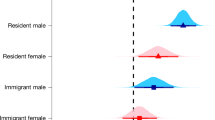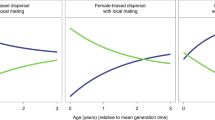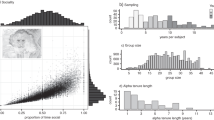Abstract
AFRICAN lions live in complex social groups and show extensive cooperative behaviour1–10. Here we describe a new application of DNA fingerprinting that unequivocally demonstrates the kinship structure of lion 'prides': female companions are always closely related, male companions are either closely related or unrelated, and mating partners are usually unrelated. The variability in relatedness among male coalition partners provides an important opportunity to test for the effects of kinship on cooperative behaviour11. Paternity analysis reveals that male reproductive success becomes increasingly skewed as coalition size increases, and the tendency to form coalitions with non-relatives drops sharply with increasing coalition size. Thus males only act as non-reproduc-tive 'helpers' in coalitions composed of close relatives.
This is a preview of subscription content, access via your institution
Access options
Subscribe to this journal
Receive 51 print issues and online access
$199.00 per year
only $3.90 per issue
Buy this article
- Purchase on SpringerLink
- Instant access to the full article PDF.
USD 39.95
Prices may be subject to local taxes which are calculated during checkout
Similar content being viewed by others
References
Schaller, G. B. The Serengeti Lion (University of Chicago Press, Chicago 1972).
Bertram, B. C. R. J. Zool. 177, 463–482 (1975).
Bertram, B. C. R. in Growing Points in Ethology (eds Bateson, P. P. G. & Hinde, R. A.) 281–301 (Cambridge University Press, Cambridge, 1976).
Bygott, J. D., Bertram, B. C. R. & Hanby, J. P. Nature 282, 839–841 (1979).
Packer, C. & Pusey, A. E. Nature 296, 740–742 (1982).
Packer, C. in Ecological Aspects of Social Evolution (eds Rubenstein, D. I. & Wrangham, R. W.) 429–451 (Princeton University Press, Princeton, 1986).
Pusey, A. E. & Packer, C. Behaviour 101, 275–310 (1987).
Packer, C. et al. in Reproductive Success (ed. Clutton-Brock, T. H.) 363–383 (University of Chicago Press, Chicago, 1988).
Packer, C., Scheel, D. & Pusey, A. E. Am. Nat. 136, 1–19 (1990).
Scheel, D. & Packer, C. Anim. Behav. 41, 697–710 (1991).
Hamilton, W. D. J. theor. Biol. 7, 1–52 (1964).
Packer, C. & Pusey, A. E. in Infanticide: Comparative and Evolutionary Perspectives (eds Hausfater, G. & Hrdy, S. B.) 31–42 (Aldine. New York, 1984).
Hanby, J. P. & Bygott, J. D. Anim. Behav. 35, 161–169 (1987).
Packer, C. & Pusey, A. E. Am. Nat. 121, 716–728 (1983).
Packer, C. et al. Conservation Biology (in the press).
O'Brien, S. J. et al. Nat. geogr. Res. 3, 114–124 (1987).
Wildt, D. E. et al. Nature 329, 328–331 (1987).
Yuhki, N. & O'Brien, S. J. Proc. natn. Acad. Sci. U.S.A. 87, 836–840 (1990).
Gilbert, D., Packer, C., Pusey, A. E. & O'Brien, S. J. (submitted).
Jeffreys, A. J., Wilson, V. & Thein, S. L. Nature 316, 76–79 (1985).
Burke, T. Trends Ecol. Evol. 4, 139–144 (1989).
Burke, T., Davies, N. B., Bruford, M. W. & Hatchwell, B. J. Nature 338, 249–251 (1989).
Strassman, J. E. et al. Nature 342, 268–270 (1989).
Rissing, S. W., Pollock, G. B., Higgins, M. R., Hagen, R. H. & Smith, D. R. Nature 338, 420–422 (1989).
Sherman, P. W. Nature 338, 418–420 (1989).
Packer, C. & Pusey, A. E. Anim. Behav. 31, 334–340 (1983).
Lynch, M. Molec. Biol. Evol. 5, 584–599 (1988).
Author information
Authors and Affiliations
Rights and permissions
About this article
Cite this article
Packer, C., Gilbert, D., Pusey, A. et al. A molecular genetic analysis of kinship and cooperation in African lions. Nature 351, 562–565 (1991). https://doi.org/10.1038/351562a0
Received:
Accepted:
Issue date:
DOI: https://doi.org/10.1038/351562a0
This article is cited by
-
When are females dominant over males in rats (Rattus norvegicus)?
Behavioral Ecology and Sociobiology (2024)
-
Habitat quality affects the social organization in mouse lemurs (Microcebus griseorufus)
Behavioral Ecology and Sociobiology (2023)
-
Kinship study reveals stable non-kin-based associations in a medium-sized delphinid
Behavioral Ecology and Sociobiology (2023)
-
Collaborative behaviour and coalitions in male jaguars (Panthera onca)—evidence and comparison with other felids
Behavioral Ecology and Sociobiology (2022)
-
Should I stay or should I go now: dispersal decisions and reproductive success in male white-faced capuchins (Cebus imitator)
Behavioral Ecology and Sociobiology (2022)



